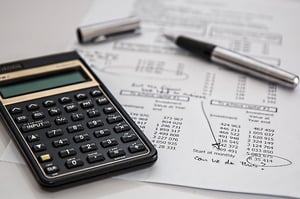 One of the most common questions we field this time of year is whether tax debt is dischargeable. So many people are under the impression that tax debt can never be discharged in a bankruptcy, but that is not always the case! As with many things in bankruptcy, and life, the answer is not a simple yes or no, but it is possible to discharge taxes. Read more to find out if your tax debt might be discharged in a bankruptcy.
One of the most common questions we field this time of year is whether tax debt is dischargeable. So many people are under the impression that tax debt can never be discharged in a bankruptcy, but that is not always the case! As with many things in bankruptcy, and life, the answer is not a simple yes or no, but it is possible to discharge taxes. Read more to find out if your tax debt might be discharged in a bankruptcy.
Some Taxes are Never Dischargeable
Right off the bat, it is important to know that there are certain taxes that cannot be discharged in a bankruptcy, and usually they relate to running a business, and if/when the business closes, they could be personally assessed against the business owner. These types of taxes include payroll/withholding tax, sales tax, excise tax, unemployment tax, and other taxes that a business owner might be responsible to pay. If you find yourself struggling to pay these types of tax debts, a bankruptcy could still help by eliminating other types of debt, but the bankruptcy would not eliminate your liability to pay the tax debt itself.
Personal Income Taxes May Be Dischargeable
The type of tax debt that can be discharged is the most common type of tax debt: personal income tax. That being said, in order to be discharged in a bankruptcy, the taxes must meet certain criteria established by the bankruptcy code, and even then, we can only say the tax debt SHOULD BE discharged, we can never guarantee the discharge of tax debt because when dealing with the IRS, we can never make guarantees. The criteria for determining if tax debt is dischargeable are as follows:
The Tax Returns Must Be Filed By You
The first requirement is that the tax returns must have been filed by you—this means that if the taxing authorities file tax returns on your behalf, the resulting tax debt would not be discharged. Because this is true, it is always important to make sure that you are filing your own tax returns, even if they are late, and even if they are eventually filed by the taxing authorities.
The Taxes Must Have Been Due at Least Three Years Prior to the Bankruptcy Filing
The second requirement is that the tax liabilities must be for a tax year for which returns were due to be filed at least three years prior to the date the bankruptcy is filed—for example, the 2016 taxes were due to be filed in April of 2017, so in order to be discharged in a bankruptcy, the bankruptcy must be filed after that same due date passes in April of 2020.
The Taxes Must Have Been Filed at Least Two Years Prior to the Bankruptcy Filing
The third requirement is that the tax returns that created the liability that you are trying to discharge must have been filed at least two years prior to your bankruptcy filing. This requirement is important because if you have old tax debt that would otherwise be dischargeable, but you file the taxes right before the bankruptcy filing, they WILL NOT be discharged in the bankruptcy. (NOTE: There is also some case law that says that late filed returns cannot be discharged, but, at this point, it seems to be very case specific and is not a hard and fast rule).
There Must Not Have Been an Assessment within the 240 Days Prior to Filing
The last requirement is that there must not have been an assessment for the given tax years in the 240 days prior to the bankruptcy filing. This is the trickiest and most difficult requirement to pin down because you do not always know if there is an audit taking place or if there has been an assessment. This requirement is the main reason that we are never really able to tell you with 100% certainty that your taxes will be discharged by your bankruptcy.
How Do You Know?
The best way to know if the taxes you owe are dischargeable is by requesting your tax transcripts from the IRS. You can request one here: https://www.irs.gov/individuals/get-transcript. If you request a transcript, it will ask you what type you would like, and for the information you are looking for, you would want to request the “Account Transcript.” This will show you when your returns were filed, how much you still owe on them, if there were any assessments, and more. But more importantly, let us help! Even if your taxes are not dischargeable, there may be other ways that we can help, and we would be happy to discuss them with you!
Call now for a free strategy session with a MN Bankruptcy Attorney from Kain & Scott
When the time is right, or when you are ready, reach out to Minnesota’s LARGEST bankruptcy law firm at www.kainscott.com. You will be glad you did!


